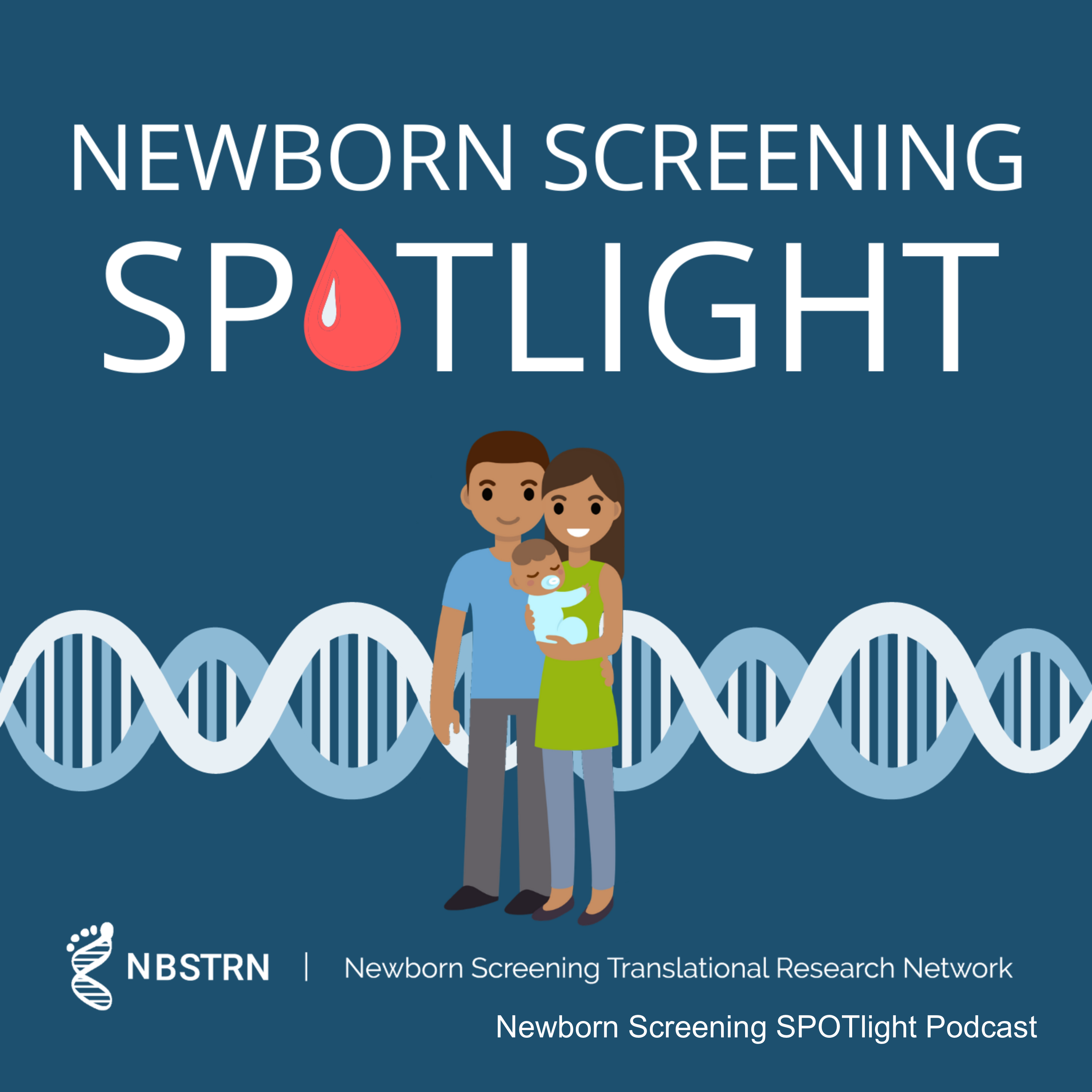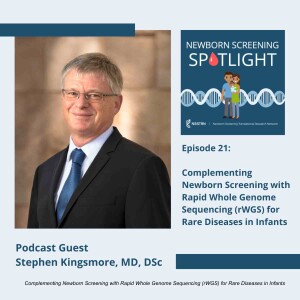
6.1K
Downloads
27
Episodes
This podcast is about the advancement of rare disease research told by health professionals, researchers, parents, and advocates. This podcast is for you to learn how newborn screening research saves the lives of babies every day through discoveries of new technologies and treatments. You will hear stories from experts who treat babies, the families who care for them, and the researchers who make it all happen.
Episodes

Friday Mar 10, 2023
Friday Mar 10, 2023
We are thrilled to have Dr. Stephen Kingsmore, a dedicated physician, researcher, an inventor, and who is the currently the President/CEO of Rady Children's Institute for Genomic Medicine in San Diego, California. In this podcast, you will not only learn what drives Dr. Kingsmore’s purpose to improve the lives of newborns and to prevent avoidable and unnecessary deaths due to late diagnosis of rare genetic condition, but also his challenges in clinical practice and research in making his dream of a learning healthcare system using genomic medicine a reality globally. Among his achievements, Dr. Kingsmore pioneered the development of ultra-rapid Whole Genome Sequencing to decode rare disease in newborns. In 2021, he led the RCIGM team to break his own world speed record by achieving diagnosis via WGS in 13.5 hours. Dr. Kingsmore came to Rady Children’s in 2015 from Children’s Mercy Kansas City, where he was the Executive Director of Medical Panomics. He previously served as President and CEO of the National Center for Genome Resources; COO of Molecular Staging Inc.; Vice President of Research at CuraGen Corporation; founder of GatorGen; and Assistant Professor at the University of Florida’s School of Medicine. Dr. Kingsmore received MB, ChB, BAO and DSc degrees from the Queen’s University of Belfast. He trained in clinical immunology in Northern Ireland and did residency in internal medicine and fellowship at Duke University Medical Center. He is a fellow of the Royal College of Pathologists. Learn from Dr. Kingsmore how to work through the challenges in research and clinical practice in advancing newborn screening research.
Podcast Interview Questions
- Thank you, Dr. Kingsmore, for being a guest on the NBSTRN podcast, NBS SPOTlight. We are excited to speak with you today! Dr. Kingsmore, you are currently the President/CEO of Rady Children's Institute for Genomic Medicine, where you lead a multi-disciplinary team of scientists, physicians and researchers who are pioneering the use of rapid Whole Genome Sequencing to enable precise diagnoses for critically ill newborns. How did your interest in rare disease research lead you to San Diego?
- Many of us remember specific milestones you and your team have accomplished and your calls to action have inspired stakeholders across the NBS community. During your presentation at our NBS Research Summit in 2021 you spoke about “NBS and Rapid Whole Genome Sequencing (rWGS) for Severe Infant Onset Genetic Diseases". Most recently, you were a part of the International Conference on Newborn Sequencing (ICoNS) in augural meeting where you joined researchers from across the world to share information about newborn sequencing initiatives. What were the major takeaways from that meeting, and what should the NBS Research Community be aware of?
- You recently published that your team has developed a “Scalable, high quality, whole genome sequencing from archived, newborn, dried blood spots.” Up to eighty-one genetic diseases are included in screening, thirty-six of which are recommended for NBS by a federal advisory committee known as the Recommended Uniform Screening Panel. As you know, there are more than 7,000 rare genetic diseases (RD) that affect 6-8% of the US population or about 30 million Americans. Addition to the RUSP is a lengthy process. What are your thoughts on how the use of genome sequencing using dried blood spots to identify rare diseases could change the landscape of newborn screening policy when we currently adopt one condition at a time and the nationwide implementation can take years?
- We appreciate your contribution to the American Journal of Medical Genetics Special Issue on Newborn Screening Research, where Dr. Amy Brower and Dr. Kee Chan were co-editors of this issue. Your article on the “Dispatches from Biotech beginning BeginNGS: Rapid newborn genome sequencing to end the diagnostic and therapeutic odyssey” highlights the BeginNGS, a consortium in collaboration with academia, pharmaceuticals, biotechnology and non-profit organization to provide a platform for implementing whole-genome sequencing for newborn screening, disease management and interventions, and rare disease drug development for use by partners around the world. Could you share the work in progress as of now?
- If we were to implement whole-genome sequencing for newborn screening globally one day, how do you envision long-term follow-up of management of care for the patient and families, including medical, non-medical, psychological services, education, and other related services to improve the quality of life to be supported?
- You received your medical training from the Queen’s University of Belfast in Ireland. You trained in clinical immunology in Northern Ireland and did residency in internal medicine and fellowship at Duke University Medical Center. You are also a fellow of the Royal College of Pathologists. What sparked your interest in newborn screening?
- You have such a long history of successes and accomplishments that have global impact on health care and public health. In March of 2015, you surpassed your previous record in genetic sequencing by reducing the process to 26 hours, which was recognized in April 2016 by Guinness World Record as the fastest genetic sequencing in the world. Now, I think your team has reduced the time again. On the flip side of the coin, would you mind sharing your biggest challenge —and what did you learn from that experience?
- What’s your biggest challenge in your research right now, and how are you tackling it? How could NBSTRN data tools and resources assist you?
- What does NBS research mean to you?

No comments yet. Be the first to say something!